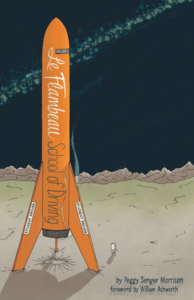Le Flambeau School of Driving
Reviewed by William Shetter
February 1, 2017
 By Peggy Senger Morrison. Unction Press, 2016. 314 pages. $15/paperback; $10/eBook.
By Peggy Senger Morrison. Unction Press, 2016. 314 pages. $15/paperback; $10/eBook.
Rarely have I read a book focused on our Quaker “living experientially” that so skillfully and engagingly infuses a wide range of lived experiences—from ministry to motorcycling—with penetrating, and sometimes refreshingly unpredictable, spiritual insights. Peggy Morrison calls herself a “freelance provocateur of grace,” presenting us here with a collection of spiritual exploration stories she calls “the stories of a student driver.” The foreword (by Friend William Ashworth) goes a step further and calls her “God’s very own loose cannon.” She is a recorded minister and pastor of a Friends church in Salem, Ore., that is rooted theologically in Evangelical Quakerism and, at the same time, adheres to the social-gospel tradition and silence-based practice of unprogrammed Friends. For many years Morrison has been a counselor focusing on trauma healing, a role which led her to work in Africa, and her multiple trips there provided a large share of the experience we read about.
The stories, an average two to three pages in length, are grouped into eight sections, each a different facet of Morrison’s experience. The first section comes right to the point: “Spiritual Disciplines for the Twenty-first Century”—gratitude, failure, forgiveness, courage, compassion, and others. The first mini-essay, in a way the tone-setter for the whole book, is about the spiritual discipline of adventure. Here Morrison reminds us of “the intentional choosing of the less certain way in order to allow the Divine maximum room to move.” In other sections, she relates, through the medium of anecdotes, how as a child and youth she learned basic truths about herself, life, and her place in it. She explores what it feels like to belong to a sexual orientation minority, the multiple challenges women face, and courageous ways they respond.
Another group of stories tells how the “warming world” and current events have taught Morrison’s mature self deeper theological insights. Another section is devoted to demolishing a number of myths that we allow to limit our spiritual adventure, such as the illusions of isolation, centrality, irrelevancy, or the narrow will of God.
Morrison meditates at length on the Quaker experience, questioning our familiar “proselyphobic” hesitancy in proclaiming our faith. She also reflects on speaking truth and the true meaning of worship in the Bible’s “be still.” My favorite here was the story “Waiting Worship,” where in an airport arrivals lounge she senses the prevailing mood of eager anticipation of meeting loved ones, and wonders why our waiting worship shouldn’t be pervaded by the same consuming expectation: our meetings are, after all, “sacred arrivals lounges.”
In 1990 Nelson Mandela was released from prison after 27 years. It happened to be a Sunday morning, and I felt that witnessing such a triumph of human dignity was more important than going to meeting for worship. Morrison tells us that she got up early on that same cold morning and shed tears of joy as she watched events on television. She was led to reflect on what freedom is, especially inner freedom—knowing truth about yourself. This leads into the longest of the sections, recounting the “spiritual learning curve” created by her stays and work in Africa. Morrison does not hesitate to tackle topics such as continuing revelation, or how our actions can change the world. This section is different from the others in that it offers few fresh insights. Rather, it meditates on how Morrison’s previous learning from experience equipped her to understand very different and often extremely challenging cultural conditions. Twenty-three of these pages narrate a journey that provides, in her vivid, highly personal style, a succinct but vivid picture of Central African cultural and physical conditions fraught with wartime danger.
The whimsical drawing on the book’s cover shows the words “School of Driving” not on a car but on a powerful-looking rocket that has just landed, as a little figure sets out to explore an extraterrestrial landscape. This cleverly conveys the way the whole book takes off with the energy of Morrison’s bold and unrelenting search for God in all corners of experience. On the rocket’s fins one sees the words “student driver”: her journey does not always lead to a major revelation, but she always learns something; all her life is a learning experience, as are all our lives. More information and some comments can be found at Morrison’s website, unction.org.



Comments on Friendsjournal.org may be used in the Forum of the print magazine and may be edited for length and clarity.